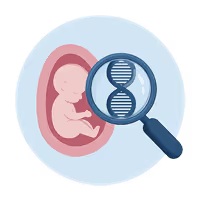What is Ovarian Cancer?
Ovarian cancer occurs when abnormal cells in the ovaries, fallopian tubes or peritoneum begin to grow and divide in an uncontrolled way, forming a tumour. The ovaries are part of the female reproductive system and are responsible for producing eggs and hormones like oestrogen and progesterone. The fallopian tubes are the tubes that eggs travel down to reach the uterus. The peritoneum is a membrane that lines the inside of the abdomen.
There are several different types of ovarian cancer. The most common type is epithelial ovarian cancer. Ovarian cancer is a gynaecological cancer, but is distinct from other gynaecological cancers such as endometrial cancer or cervical cancer.
The symptoms of ovarian cancer can include:
- Persistent bloating or swelling of the abdomen
- Feeling full quickly or difficulty eating
- Pelvic or abdominal pain
- Needing to urinate more often or more urgently
- Changes in bowel habits (such as constipation)
- Unexplained weight loss
- Extreme tiredness
- Pain during sex
These symptoms are common to many less serious conditions, but if they are new, persistent, or frequent, it’s important to see a doctor. Early diagnosis can make a big difference to treatment outcomes. If you are experiencing any symptoms that are worrying you, it is important that you report this to your GP.
More information about ovarian cancer can be found on the Macmillan website.
What are the causes?
Usually, when someone is diagnosed with cancer, the cause is unknown. Contributing factors may include age, family history, environment, lifestyle and hormonal factors.
In some cases, genetic testing can identify a variant (change) in a single gene that causes a person to have an increased risk of developing certain cancers over their lifetime. These gene variants can be passed down through families
Around 15-20% of ovarian cancers are linked to inherited genetic mutations, most commonly in the BRCA1 and BRCA2 genes. People of Ashkenazi Jewish descent are at particularly higher risk, with about 1 in 40 carrying a BRCA mutation compared to about 1 in 400 in the general population.
Is genetic testing for ovarian cancer risk genes right for me?
Some people with a personal diagnosis or strong family history of ovarian cancer or related cancers, such as breast cancer, may choose to consider genetic testing to try and identify a cause for their diagnosis or their family history. People from certain ethnic backgrounds, such as those with Ashkenazi Jewish ancestry, also have a higher chance of carrying a variant in a cancer risk gene such as BRCA1 or BRCA2, and may wish to explore genetic testing.
Identifying a variant in a cancer gene can help clarify personal risk of developing certain cancers and inform your risk management options such as removal of the ovaries and fallopian tubes to reduce the risk of developing ovarian cancer.
Genetic testing can provide very useful information, but may not be the right choice for everyone. Speaking to a genetic counsellor can help you explore your personal and family history, understand what testing might mean for you and your family, and help you make a decision that feels right for you.
































